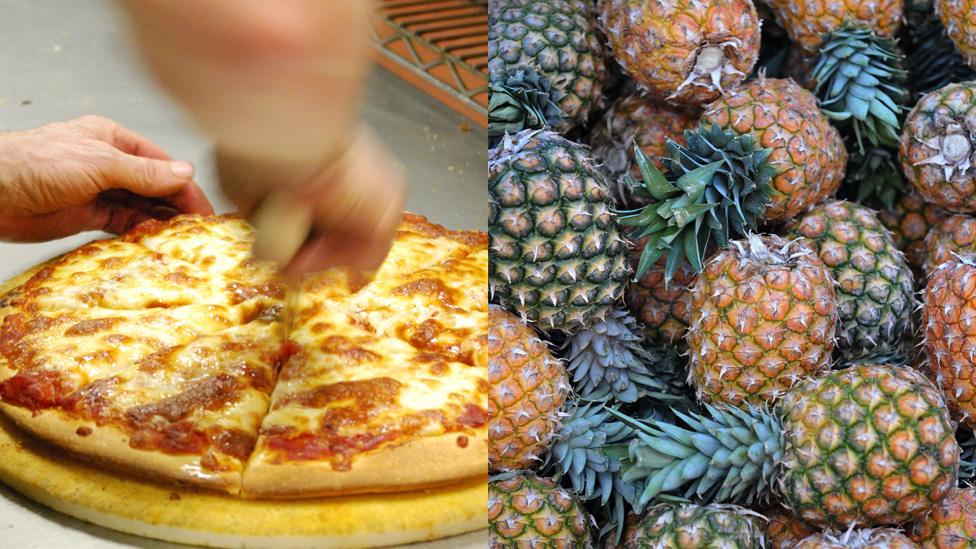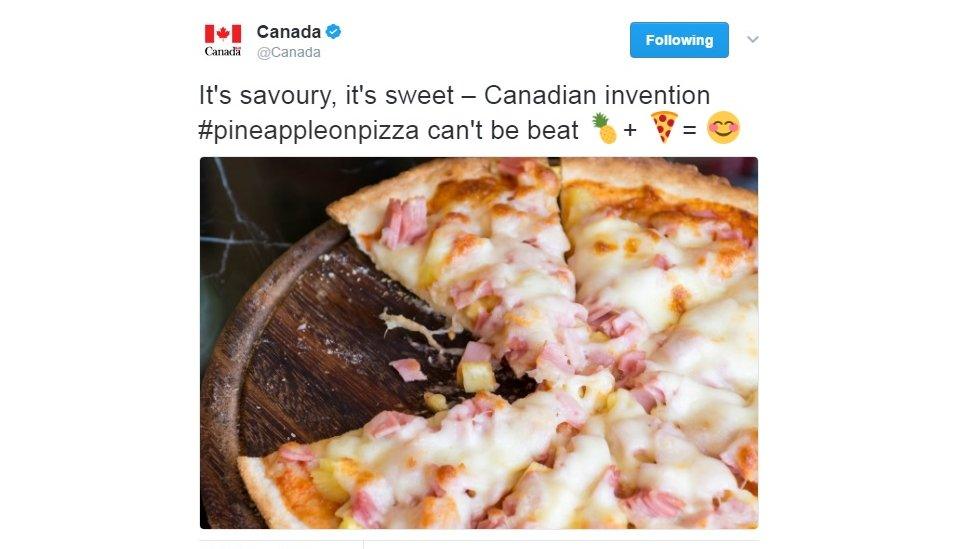Aloha! Meet the Ontario man who created pineapple pizza
- Published

Hawaiian pizza's Ontario roots
In a fit of fancy over half a century ago, Sam Panopoulos and his brother tossed some canned pineapple onto a pizza in their southwestern Ontario restaurant.
Little did he know he would be inventing one of the most popular - and divisive and debated - pizzas in the world, one that recently grabbed headlines after Iceland's president announced he was "fundamentally opposed" to the topping.
"We just put it on, just for the fun of it, see how it was going to taste," Panopoulos, 83, told the BBC. "We were young in the business and we were doing a lot of experiments."
The brothers were not sure their creation would be any good. But in the end, they liked its savoury sweetness and so did their Canadian diners.
"We tried it first, passed it to some customers," he says. "And a couple of months later, they're going crazy about it. So we put it on the menu."
Its tropical name - "Hawaiian"- came off the can of pineapples used in that first creation.
Panopoulos, who came to Canada from Greece in 1954, says he was the first to add the fruit to pizza - a dish that was still a curiosity in Canada in the 1960s, he recalls.
He and his late brother were then owners of the Satellite Restaurant in Chatham, Ontario, a town about 290 km (180 miles) from Toronto and 80 km (50 miles) from Detroit, where they served the pizza alongside Chinese dishes, traditional breakfasts, and burgers and fries.

Canada's official twitter account also weighed in
At the time, pizza was making its way into restaurants north of the border from that US city, up through the nearby Canadian community of Windsor.
The first Boston Pizza, a Canadian pizza chain, opened its first restaurant in Edmonton, Alberta, in 1964. Another chain, Pizza Pizza, was founded in Toronto in 1967.
The creation also capitalised on the mid-century tiki trend, which popularized Polynesian culture in North America and is having a bit of a revival, external.
Panopoulos says pizza toppings in those days were mostly limited to mushrooms, bacon and pepperoni.
"People didn't go for a lot of different tastes and foods, you know? The only thing you could find then sweet-and-sour was Chinese, nothing else. Everything else was plain," he says.

Iceland President Gudni Johannesson
Panopoulos says he gets interview requests about the origins of the pineapple pizza pie every few years or so, but was surprised by the flood of calls he has received since Iceland President Gudni Thorlacius Johannesson suggested to a group of high school he would ban pineapples from pizza if he could.
"What's going on with everybody?" Panopoulos asks.
The president's comments launched furious but tongue-in-cheek protests online over whether people loved or loathed the topping, and he eventually took to Facebook, external to clarify his stance on the issue.
"I like pineapples, just not on pizza. I do not have the power to make laws which forbid people to put pineapples on their pizza. I am glad that I do not hold such power. Presidents should not have unlimited power," he wrote.
"I would not want to hold this position if I could pass laws forbidding that which I don´t like. I would not want to live in such a country. For pizzas, I recommend seafood."

Someone sent a pineapple pizza to Iceland's embassy in London
Panopoulos says he does not understand the president's opposition to the pineapple topping, which he feels gives the dish a "refreshing" bite.
"The guy is crazy. He doesn't grow a lot of pineapples up there. He has a lot of fish - so he says put fish on it," he says.
Panopoulos sold the Satellite Restaurant in 1980 and now lives in the nearby city of London. He says he has not cooked a pizza for years and now sticks to store-bought frozen pies.
And while he says he wishes he had done more to patent the idea back then, he is really just "glad we came up with something people like to eat."
- Published16 February 2017

- Published24 February 2017
